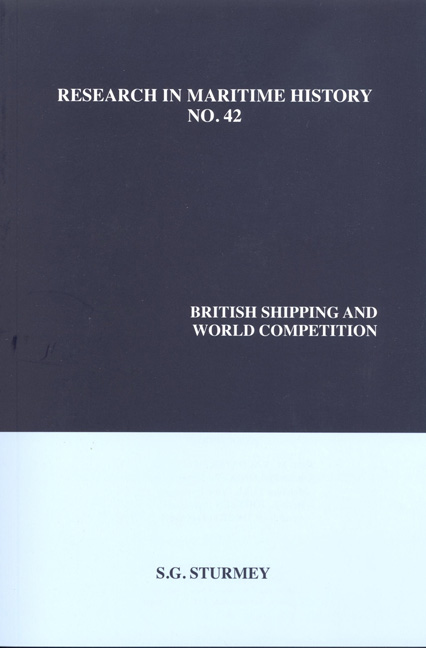Book contents
- Frontmatter
- Table of Contents
- Series Editor's Foreword
- About the Author
- Preface
- Figures and Tables
- Chapter 1 The Problem Defined
- Chapter 2 High Water: The Pre-1914 Period
- Chapter 3 War and Reconstruction
- Chapter 4 The Troubled Years: The Interwar Period
- Chapter 5 Nationalism in Shipping in the Interwar Years
- Chapter 6 The Birth of the Liberty
- Chapter 7 The Prosperous Age: The Postwar Period
- Chapter 8 Enemies of Competition in the Postwar Years
- Chapter 9 Flags of Convenience
- Chapter 10 Economics of Shipping Enterprises
- Chapter 11 Shipowning and Resource Allocation
- Chapter 12 Labour Relations and Labour Costs (by Basil Mogridge)
- Chapter 13 The Conference System
- Chapter 14 The Structure of the British Industry
- Chapter 15 The Question Answered
- Epilogue The Future
- Appendix The Contribution of British Shipping to the Balance of Payments
- Bibliography
- Index
Chapter 13 - The Conference System
- Frontmatter
- Table of Contents
- Series Editor's Foreword
- About the Author
- Preface
- Figures and Tables
- Chapter 1 The Problem Defined
- Chapter 2 High Water: The Pre-1914 Period
- Chapter 3 War and Reconstruction
- Chapter 4 The Troubled Years: The Interwar Period
- Chapter 5 Nationalism in Shipping in the Interwar Years
- Chapter 6 The Birth of the Liberty
- Chapter 7 The Prosperous Age: The Postwar Period
- Chapter 8 Enemies of Competition in the Postwar Years
- Chapter 9 Flags of Convenience
- Chapter 10 Economics of Shipping Enterprises
- Chapter 11 Shipowning and Resource Allocation
- Chapter 12 Labour Relations and Labour Costs (by Basil Mogridge)
- Chapter 13 The Conference System
- Chapter 14 The Structure of the British Industry
- Chapter 15 The Question Answered
- Epilogue The Future
- Appendix The Contribution of British Shipping to the Balance of Payments
- Bibliography
- Index
Summary
As an almost classic example of cartellization, the conference system has always attracted attention. The intention of this chapter is, first, to provide sufficient information about conferences to place them in their context as an element in liner operations and, second, to answer the question, “What effect, if any, have conferences had on the development of British shipping?” For these purposes it is not necessary to present a complete account of the operations of conferences or to examine fully the cases for and against them.
Conference Organization
A conference is an association of competing liner owners engaged in a particular trade who have agreed to limit the competition existing among themselves. As a minimum, they will have agreed to charge freight rates or passenger fares for each class of traffic according to an agreed schedule of charges and to show no discrimination among shippers. To the agreement foreswearing all forms of price competition may be, and usually is, added an agreement to regulate sailings according to a pre-determined pattern and to recognize the berth rights of other members. A further step may be to add a full pooling agreement under which profits and losses on the trade covered by the conference are shared among the member lines. When this stage is reached competition between the conference lines has ceased completely. In addition to these internal arrangements, each conference may have an agreement with the shippers, that is, with its customers. This is known as a loyalty contract and is designed to secure the continued custom of the shipper and to prevent the entry of outside competition. When such a contract has been completed the conference usually agrees to provide a regular service, either by each member acting independently or by collective action. The conference does not agree to, although members usually will, provide additional sailings when trade is at a peak, while shippers have no sanctions under the contract against shipowners who fail to provide the contract sailings.
The need for a conference system arises from the economics of liner operations. Once a liner has been put on berth in a trade practically all costs become overhead costs, and the additional cost of carrying an extra ton of cargo is only the cost of loading and discharging that cargo.
- Type
- Chapter
- Information
- British Shipping and World Competition , pp. 271 - 300Publisher: Liverpool University PressPrint publication year: 2009

